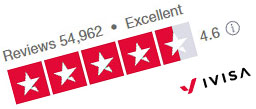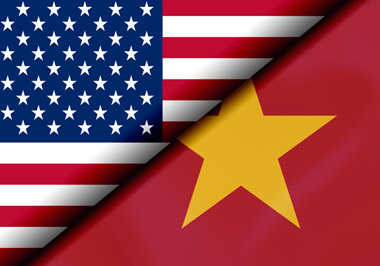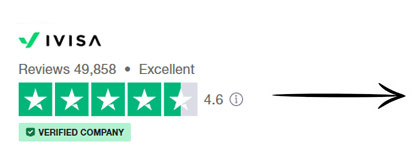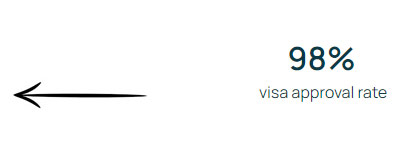Vietnam e-visa for US citizens
For US citizens wishing to travel to Vietnam, obtaining a visa is an essential step before departure. The United States is not a visa waiver country, so travelers must obtain a visa before entering Vietnam.
 Fast: Simplified, efficient process.
Fast: Simplified, efficient process.
 Security: information is protected.
Security: information is protected.
 Reliability: 98% approval rate.
Reliability: 98% approval rate.
 Assistance: 24/7 customer support.
Assistance: 24/7 customer support.


The easiest solution for American tourists is the Vietnamese e-visa, which enables them to submit an application online without having to visit an embassy. This e-visa is valid for a stay of up to 90 days, and can be used for single or multiple entries. The application process is entirely digital, making it fast and convenient for US citizens. The cost of an e-visa is typically between 25 and 50 USD, depending on the type of entry chosen. Once the application has been submitted, processing takes between 3 and 5 working days. This visa is essential for access to the country's major entry points, whether by air, land or sea.
Vietnam visa application for US citizens
- Visa requirement: Yes, US citizens must obtain a visa to enter Vietnam, whether electronically (e-visa) or via other options such as visa-on-arrival with pre-approval.
- E-visa available: Americans can apply online for an e-visa, valid for stays of up to 90 days.
- Price: The cost of an e-visa for a stay in Vietnam is 25 USD for single entry and 50 USD for multiple entry.
- Processing time : The e-visa is generally processed in 3 to 5 working days.
- Validity period: The e-visa is valid for a maximum of 90 days, with single or multiple entry options.


US citizens can easily apply for a Vietnam e-visa online. This simplified process avoids complicated embassy or consulate procedures. The e-visa is generally recommended for short-term tourist or business stays. Here are the steps to follow to complete the application.
To apply for an e-visa, US citizens must prepare the following documents:
Fees for a Vietnam e-visa depend on the type of entry requested:
Fees must be paid online and are non-refundable, even if the application is rejected. It is also important to note that processing fees may be added to these government fees.
The processing time for an e-Visa to Vietnam depends on the time period for which the application is submitted, as well as the workload of the Vietnamese authorities. For US citizens, the standard processing time is 3 to 5 working days. However, it is advisable to submit the application several weeks in advance, especially during peak tourist periods or public holidays in Vietnam.
In some cases, expedited processing is possible through specialized agencies offering urgent processing options. These agencies can provide an e-visa in 2-3 days, or even a few hours in urgent cases, but these services come at an additional cost.
It is recommended not to book air tickets or other travel arrangements before receiving confirmation of visa approval, to avoid possible complications.
The e-visa for Vietnam offers US citizens several options for organizing their stay, depending on the duration and number of entries required. This easy-to-obtain e-visa offers significant advantages in terms of flexibility and ease of travel.
US citizens can choose between two types of e-visas according to their needs:
The e-visa allows US citizens to stay in Vietnam for a maximum of 90 days, regardless of the option chosen (single or multiple entry).
This duration is ideal for extended tourist stays or business trips. It is important to note that exceeding this duration may result in penalties or difficulties in re-entering the country in the future.
Unfortunately, it is not possible to extend or renew an e-visa directly from Vietnam. US citizens wishing to extend their stay beyond the validity of their visa must leave Vietnam and apply for a new visa from abroad.
It is therefore advisable to plan your stay carefully to avoid any complications. For longer stays or frequent travels, it may be wise to opt for a visa with multiple entries, so as to easily manage return trips.
While most Vietnam e-visa applications are approved without a hitch, some may be rejected for a variety of reasons. Here are some common reasons for rejection and the steps to follow in the event of a rejection.
Common reasons for rejection :
What to do if a visa is rejected?
In the event of a visa refusal, it is essential to understand the reason for the rejection. US citizens can contact the Vietnamese embassy or consulate for clarification of the reasons for the rejection. If the problem can be corrected (such as a documentation error), a new application can be submitted after rectification.
In more complex cases, it may be advisable to consult an immigration lawyer or use a specialized agency to submit a new, more solid application.
Vietnam is generally considered a safe destination for US citizens and international travelers in general. The crime rate is relatively low, and major incidents involving tourists are rare. However, as in any country, it is advisable to take certain precautions to ensure your safety while traveling.
General safety
Vietnam's major cities, such as Hanoi and Ho Chi Minh City, are renowned for their safety, but it is always advisable to remain vigilant in busy tourist areas where pickpockets or minor scams may occur.
It is advisable to keep an eye on valuables, especially in crowded markets or when using public transport.
Natural hazards
Vietnam is prone to natural disasters such as floods and typhoons, particularly during the rainy season between May and October. US citizens should follow local weather forecasts and observe safety instructions issued by the Vietnamese authorities.
Health risks
It is recommended that American travelers take out travel insurance covering medical care abroad. Although basic medical care is available in major cities, medical facilities in rural areas may be limited.
In addition, certain vaccinations, such as those against hepatitis A and typhoid, are recommended prior to travel.
All in all, Vietnam remains a safe destination for US citizens, provided they respect local rules, are vigilant and well-prepared for climatic and health conditions.
Find out if your question has been answered in the list below
Yes, US citizens can obtain a visa on arrival, but this requires prior pre-approval. Before traveling to Vietnam, it is required to apply for a letter of invitation or pre-approval from an authorized travel agency or organization. Once the letter has been obtained, the visa can be collected from the airport on arrival. Without this letter, entry to Vietnam may be rejected. However, the e-visa is a more convenient option, as it can be applied for online prior to travel, avoiding the hassle at the airport.
In addition to the visa (e-visa or visa on arrival), US citizens must have a passport valid for at least six months after the date of entry into Vietnam. They must also print out their e-visa or bring the pre-approval letter for the visa on arrival. Sometimes, an onward or outward ticket may be requested by the authorities to prove that the traveler will be leaving Vietnam after their stay. Take the time to check that all your documents are up to date.
Yes, American children also need a visa to enter Vietnam, regardless of their age. Each child must have his or her own e-visa or visa on arrival, even if his or her name appears on a parent's passport. The same passport validity requirements apply to children. Children traveling with only one parent, or alone, must also present an authorization signed by their legal guardians. (Parents or guardians).